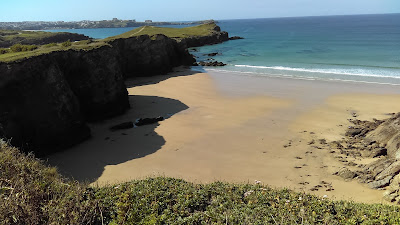Walking, Talking, Meeting, Eating
 |
| Whipsiderry Beach in Cornwall |
 |
Standard dining table shows the
small size of a tunnel entrance.
|
Down in the town of St. Agnes, the flowers on the hillsides were in full bloom, the heather making an appearance as vivid as the invading blackberries. Come and stay if you wish, the flowers seemed to say, but it won't be easy. And indeed, that seemed to be the voice echoing throughout this area. Shops seemed to be closing almost as quickly as the independent pubs, shops quickly replaced by charity or thrift shops which are exempted from the high business fees. Even the pound shop (in the U.S. these are called dollar stores) had a clearance sign outside as if its own line of cheap imported goods were also lacking enough buyers. The Brexit uncertainty was having little effect, or so I was told by one real estate agent, carefully explaining the confusing terms (to me, at least) of freehold, leasehold, and chain-free homes. But then many terms are different here, Trump of course meaning fart and fag meaning cigarette. But that was the world, wasn't it? So many things were happening that I didn't understand. There were the pangolin scales (written about in another post) but the scale of it (pun unintended) as noted in a piece in Bloomberg which mentioned that just a single intercepted shipment of such scales from Nigeria likely meant the poaching and deaths of 21,000 pangolins. Or that the average size of a 2-year old T-Rex was little more than a golden retriever (of course, at age 18 the matured adult would be larger than a school bus).
Then came this piece also in Bloomberg Businessweek about workers around the world, a reporter jumping around countries and talking to the everyday people working behind the scenes, the ones in the general public who we sometimes ignore or just assume that everything is going just fine with their lives...the janitor, the immigrant street seller, the caretaker, the seamstress. Said a robotic factory worker based in a distribution center in Germany: I worked "pick." A robot comes to me, I see on a monitor the article's name, its picture, and where it's located. It's like a chessboard, but it's vertical -- a numbered board, like A1, A2, A3. I have to check the article, make sure its correct. As soon as I remove it, I put it in a box to send to packing. I have to have a specific speed. In an hour, 300 articles. For the seamstress sewing pants, her target is 100 per hour. Said Trinh Thi Viet Ha, a Vietnamese caretaker now working in Japan and talking about what her parents gave up in order to have her as a child: I was sending money home, maybe two-thirds of my paycheck. I didn't spend much. I did go out...but I didn't go anywhere far...I talked to my family three or fours times a week so I didn't get homesick. A worker from Ghana who left his country for a better life said this about his decision: You have to think, because there is nothing for you to do. If you go and work for, for the whole month, 300 cedis [1 cedi = 18 cents], it is not enough. Because you eat. And what of your clothes? What of your rent? What of your utility bills? You have to think about it all. You see? If you are hungry in your room, you're thinking plenty. So this is where I decided to, you know, think different. Another worker in Columbia told of explaining to her daughters the murder of their fathers: ...he was murdered when she was two and a half years old. The violence. Only human beings with memories are left. It's not easy to raise your children without their fathers, but I explain to them that God is the owner of our life. He knows when we come and when we have to leave. And finally a street vendor in Barcelona, originally from Senegal: I imagined it would be different here. I dreamed of doing more with my life than just selling. But then I arrived. The language was hard, and it was very difficult to communicate with the people. The culture is very difficult, also, because the culture is like this: What's mine is mine, what's yours is yours. I come from a culture where we share everything....Here it's not like that. In the street, you see how people look at you, how they avoid being around you. I see it as racism, because if you don't want to sit next to me, if you see me on the street and the first thing you do is grab your bag, that hurts me, because that's not what I was thinking of doing.
 |
| A few of the fisherwomen of the 1800s in Cornwall |




Wow! amazing post.. Thanks for sharing!
ReplyDeleteGolden Retriever Dog Breed Information